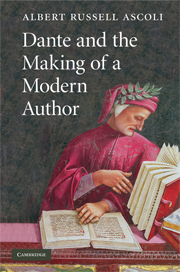Book contents
- Frontmatter
- Contents
- Preface
- Abbreviations of primary texts and translations
- INTRODUCTION
- Part 1 AN AUTHOR IN THE WORKS: DANTE BEFORE THE COMMEDIA
- Part 2 AUTHORITY IN PERSON: DANTE BETWEEN MONARCHIA AND THE COMMEDIA
- Chapter 5 “No judgment among equals”: Dividing authority in Dante's Monarchia
- Chapter 6 Palinode and history
- Chapter 7 The author of the Commedia
- Works consulted
- Index of proper names and works cited
Chapter 5 - “No judgment among equals”: Dividing authority in Dante's Monarchia
Published online by Cambridge University Press: 22 September 2009
- Frontmatter
- Contents
- Preface
- Abbreviations of primary texts and translations
- INTRODUCTION
- Part 1 AN AUTHOR IN THE WORKS: DANTE BEFORE THE COMMEDIA
- Part 2 AUTHORITY IN PERSON: DANTE BETWEEN MONARCHIA AND THE COMMEDIA
- Chapter 5 “No judgment among equals”: Dividing authority in Dante's Monarchia
- Chapter 6 Palinode and history
- Chapter 7 The author of the Commedia
- Works consulted
- Index of proper names and works cited
Summary
MONARCHIA AFTER CONVIVIO AND DE VULGARI ELOQUENTIA
At the close of the previous chapter, the stage was set for an examination of the Commedia as a logically, if not necessarily or exclusively, entailed outcome of the exercises in authority-building conducted in all three of Dante's major early works, and particularly Convivio and De Vulgari Eloquentia. There is, however, another important text that deserves consideration as an example of the next, “mature” or “finished,” stage in Dante's career, namely the Latin treatise entitled Monarchia. Monarchia, no less than the Commedia, can be read as fulfilling some part of the aspirations to auctoritas articulated in the abandoned treatises. Such a reading, I believe, gives insight into aspects of the Dantean project that cannot be seen, or are at least very difficult to see, in the “poema sacro.” In particular, the treatise helps make clear how the individual, poetic and/or theological authority with which Dante is usually associated is inextricably linked to problems of “official,” institutional auctoritas.
While the most problematic aspects of Dantean authorship have receded from view in Monarchia, this treatise as much as the earlier two can be read in terms of elaborate rhetorical strategies by which Dante both defines and delimits the authority of others and stakes his own claim to undertake such a definitional enterprise authoritatively. The first problem to address, then, is how to relate Monarchia to Dantean authorship and authority as defined in the earlier works.
- Type
- Chapter
- Information
- Dante and the Making of a Modern Author , pp. 229 - 273Publisher: Cambridge University PressPrint publication year: 2008

